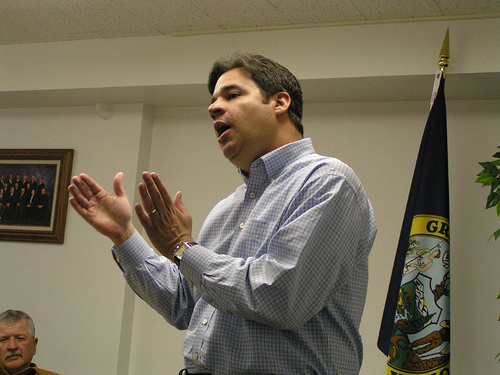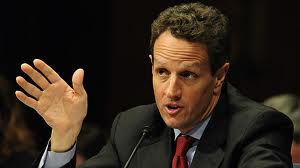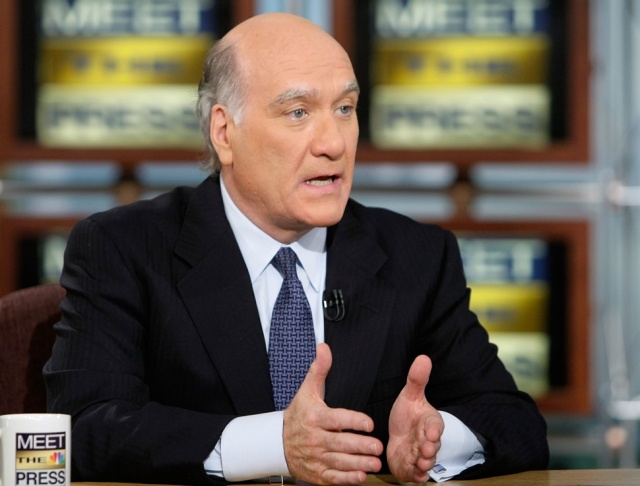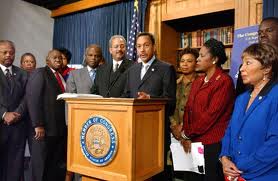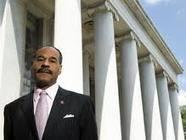 As the country braces for another presidential race in 2012, the Republicans are putting together a vicious strategy to keep President Obama from winning a second term. Many believe that the Republican Party and the Tea Party have mounted the most unified opposition to a president in history. But from my perspective, our country is engaged in the political democratic process, and our nation is practicing the system that makes us great.
As the country braces for another presidential race in 2012, the Republicans are putting together a vicious strategy to keep President Obama from winning a second term. Many believe that the Republican Party and the Tea Party have mounted the most unified opposition to a president in history. But from my perspective, our country is engaged in the political democratic process, and our nation is practicing the system that makes us great.
Many in the country are extremely disgusted with Congress and the contentious bickering and gridlock that are a part of the political system. Every policy, every appointment, every speech, every foreign trip, and every meeting is scrutinized and challenged by the opposing party. We all would like to see more bipartisan, but the system is not set up that way.
 There is a global transformation taking place in the world, and America made a transformation, when it elected the first African American president. This was a ground breaking achievement, and the history books will have to be rewritten. The ethnic group that was brought to this country to be slaves had evolved to become free educated people, and an African-American man has been elected to the highest position in the land.
There is a global transformation taking place in the world, and America made a transformation, when it elected the first African American president. This was a ground breaking achievement, and the history books will have to be rewritten. The ethnic group that was brought to this country to be slaves had evolved to become free educated people, and an African-American man has been elected to the highest position in the land.
All of the models of the past do not work, when the political pundits and experts try to come up with simple answers for the problems and crisis confronting America. Many would like the country to go back to the ‘good old days’, where political decisions were made by the ‘good old boy’ system. But everyone knows that President Obama is correct when he talks about winning the future through innovation, technology, and education.
answers for the problems and crisis confronting America. Many would like the country to go back to the ‘good old days’, where political decisions were made by the ‘good old boy’ system. But everyone knows that President Obama is correct when he talks about winning the future through innovation, technology, and education.
Everywhere you turn in the country, every politician is talking about jobs, the economy, and unemployment. But America is not prepared or ready to transition to future technologies, transportation, infrastructure, energy and education.
Instead of the Republicans developing strategic plans for the future, they are stuck on gridlock, filibuster, and make sure nothing of substance passes the Congress. They will throw everything at President Obama, including the kitchen sink, and keep things at a standstill. They will criticize everything the president does, try to reverse what he has done, and spend millions of dollars to tell the country that he is a weak president.
As the country has lost its AAA credit rating, and the $14 trillion debt that we owe, the Republicans find it easy to point to the president, and say he is the problem. They can justify their assertion with 9% unemployment, stagnant economic growth, the destruction of the middle class, and the large numbers of poor people in the country. It is logical to blame the president on his watch, and many of his supporters are beginning to believe the Republican’s talking points.
At this point, the Republicans are having a problem with finding a candidate that can unify the party with a powerful message. Even though the Tea Party was prominent in the 2010 election, their message is too radical for a presidential election. In order to win the presidency, the Republicans must win a large percentage of the independent voters.
Everyone in the country is excited about the 2012 presidential election. The incumbent always has an advantage, because the media is always reporting on everything the president is doing. The United States elected a Black President for the first time in our history, and it is time for a national catharsis to heal the divisions in the country.
A new American vision is needed in the election of 2012, and President must motivate and inspire the country that he is the man for the job. This new social contract will demand a new leadership mindset and I believe that President Obama is up.
motivate and inspire the country that he is the man for the job. This new social contract will demand a new leadership mindset and I believe that President Obama is up.














